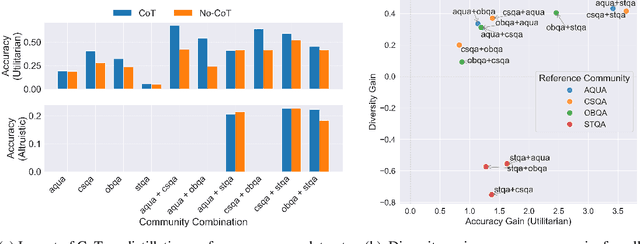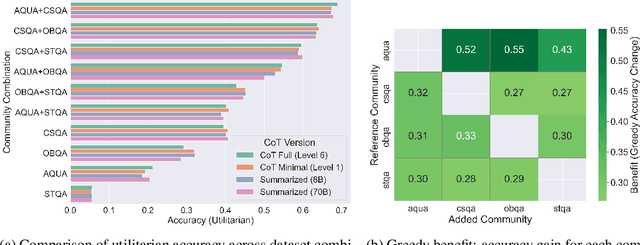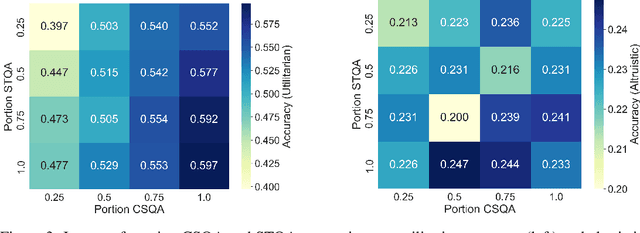Meghana Bhange
Conscious Data Contribution via Community-Driven Chain-of-Thought Distillation
Dec 20, 2025



Abstract:The current era of AI development places a heavy emphasis on training large models on increasingly scaled-up datasets. This paradigm has catalyzed entirely new product categories, such as LLM chatbots, while also raising concerns about data privacy and consumer choice. In this paper, we consider questions of data portability and user autonomy in the context of LLMs that "reason" using chain-of-thought (CoT) traces, computing intermediate text artifacts from user input before producing a final output. We first interpret recent data privacy and portability law to argue that these intermediate computations qualify as users' personal data. Then, building on the existing framework of Conscious Data Contribution, we show how communities who receive low utility from an available model can aggregate and distill their shared knowledge into an alternate model better aligned with their goals. We verify this approach empirically and investigate the effects of community diversity, reasoning granularity, and community size on distillation performance.
Crowding Out The Noise: Algorithmic Collective Action Under Differential Privacy
May 09, 2025Abstract:The integration of AI into daily life has generated considerable attention and excitement, while also raising concerns about automating algorithmic harms and re-entrenching existing social inequities. While the responsible deployment of trustworthy AI systems is a worthy goal, there are many possible ways to realize it, from policy and regulation to improved algorithm design and evaluation. In fact, since AI trains on social data, there is even a possibility for everyday users, citizens, or workers to directly steer its behavior through Algorithmic Collective Action, by deliberately modifying the data they share with a platform to drive its learning process in their favor. This paper considers how these grassroots efforts to influence AI interact with methods already used by AI firms and governments to improve model trustworthiness. In particular, we focus on the setting where the AI firm deploys a differentially private model, motivated by the growing regulatory focus on privacy and data protection. We investigate how the use of Differentially Private Stochastic Gradient Descent (DPSGD) affects the collective's ability to influence the learning process. Our findings show that while differential privacy contributes to the protection of individual data, it introduces challenges for effective algorithmic collective action. We characterize lower bounds on the success of algorithmic collective action under differential privacy as a function of the collective's size and the firm's privacy parameters, and verify these trends experimentally by simulating collective action during the training of deep neural network classifiers across several datasets.
Survey on AI Ethics: A Socio-technical Perspective
Nov 28, 2023
Abstract:The past decade has observed a great advancement in AI with deep learning-based models being deployed in diverse scenarios including safety-critical applications. As these AI systems become deeply embedded in our societal infrastructure, the repercussions of their decisions and actions have significant consequences, making the ethical implications of AI deployment highly relevant and important. The ethical concerns associated with AI are multifaceted, including challenging issues of fairness, privacy and data protection, responsibility and accountability, safety and robustness, transparency and explainability, and environmental impact. These principles together form the foundations of ethical AI considerations that concern every stakeholder in the AI system lifecycle. In light of the present ethical and future x-risk concerns, governments have shown increasing interest in establishing guidelines for the ethical deployment of AI. This work unifies the current and future ethical concerns of deploying AI into society. While we acknowledge and appreciate the technical surveys for each of the ethical principles concerned, in this paper, we aim to provide a comprehensive overview that not only addresses each principle from a technical point of view but also discusses them from a social perspective.
HinglishNLP: Fine-tuned Language Models for Hinglish Sentiment Detection
Aug 22, 2020


Abstract:Sentiment analysis for code-mixed social media text continues to be an under-explored area. This work adds two common approaches: fine-tuning large transformer models and sample efficient methods like ULMFiT. Prior work demonstrates the efficacy of classical ML methods for polarity detection. Fine-tuned general-purpose language representation models, such as those of the BERT family are benchmarked along with classical machine learning and ensemble methods. We show that NB-SVM beats RoBERTa by 6.2% (relative) F1. The best performing model is a majority-vote ensemble which achieves an F1 of 0.707. The leaderboard submission was made under the codalab username nirantk, with F1 of 0.689.
 Add to Chrome
Add to Chrome Add to Firefox
Add to Firefox Add to Edge
Add to Edge